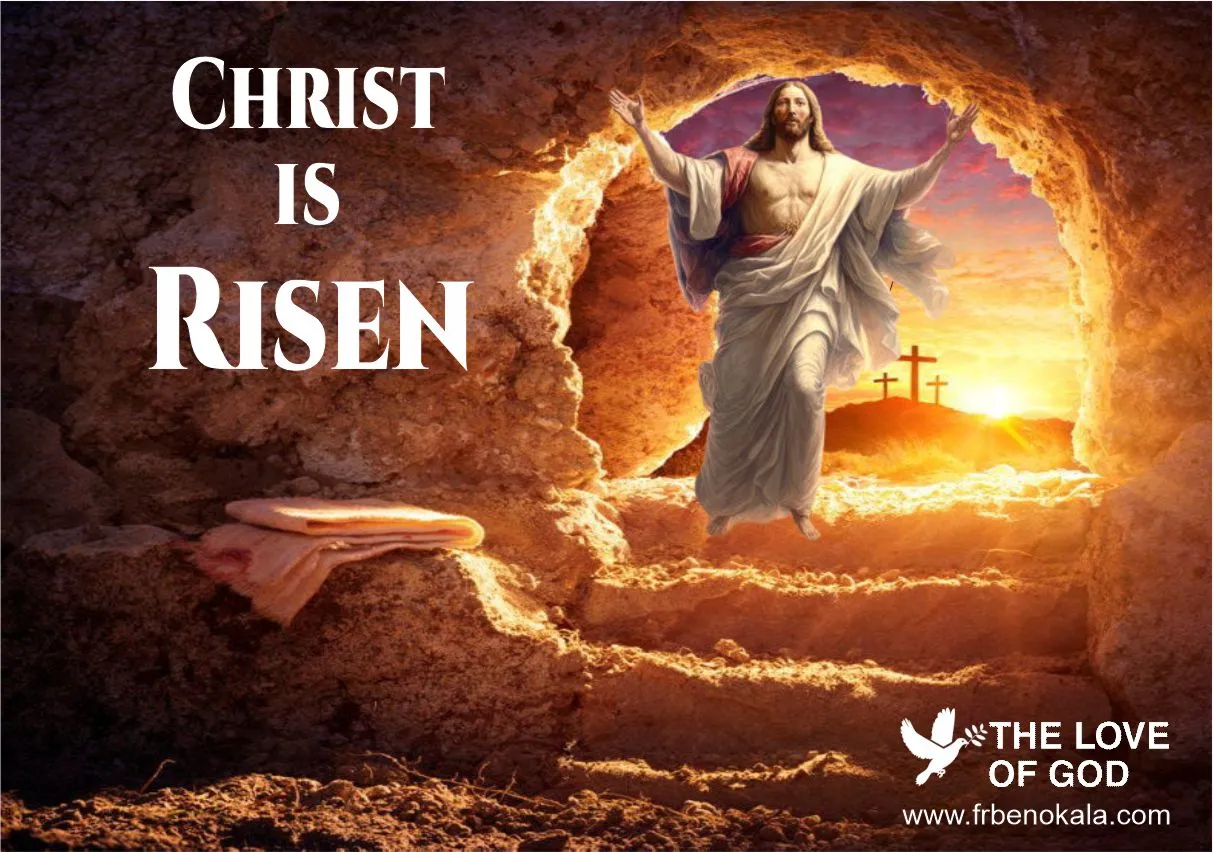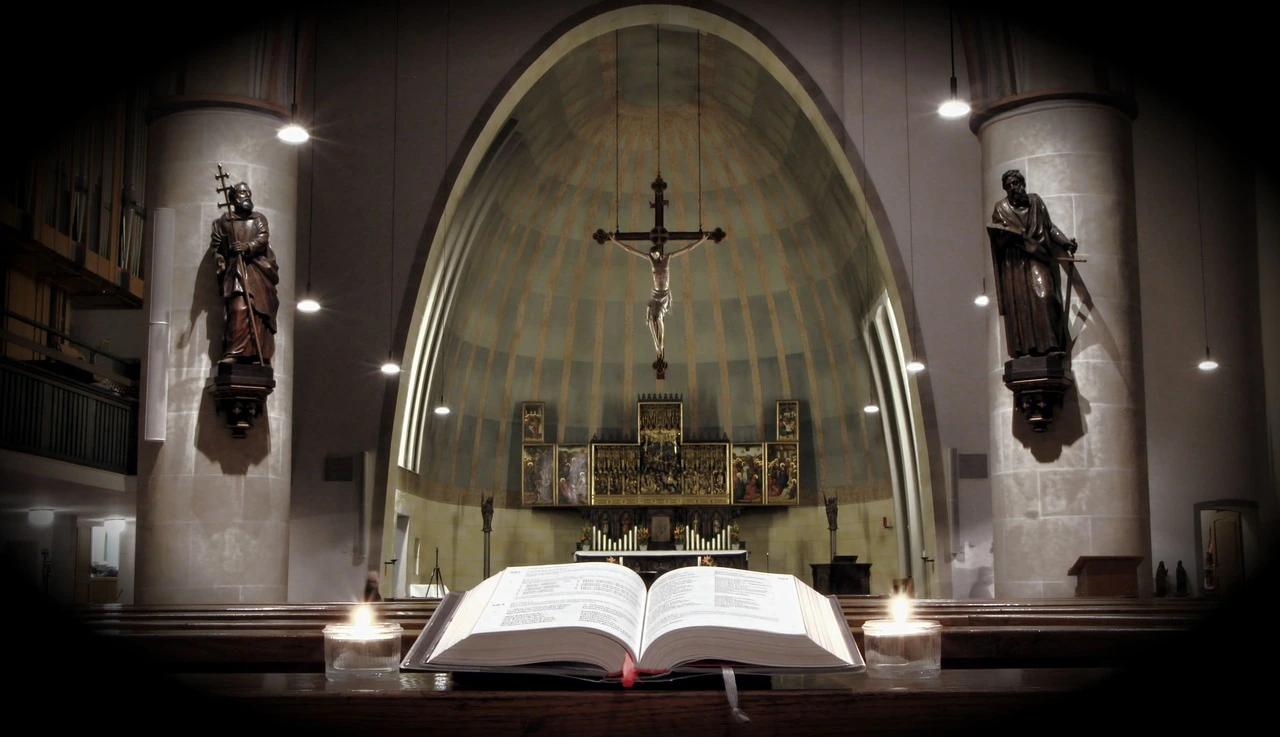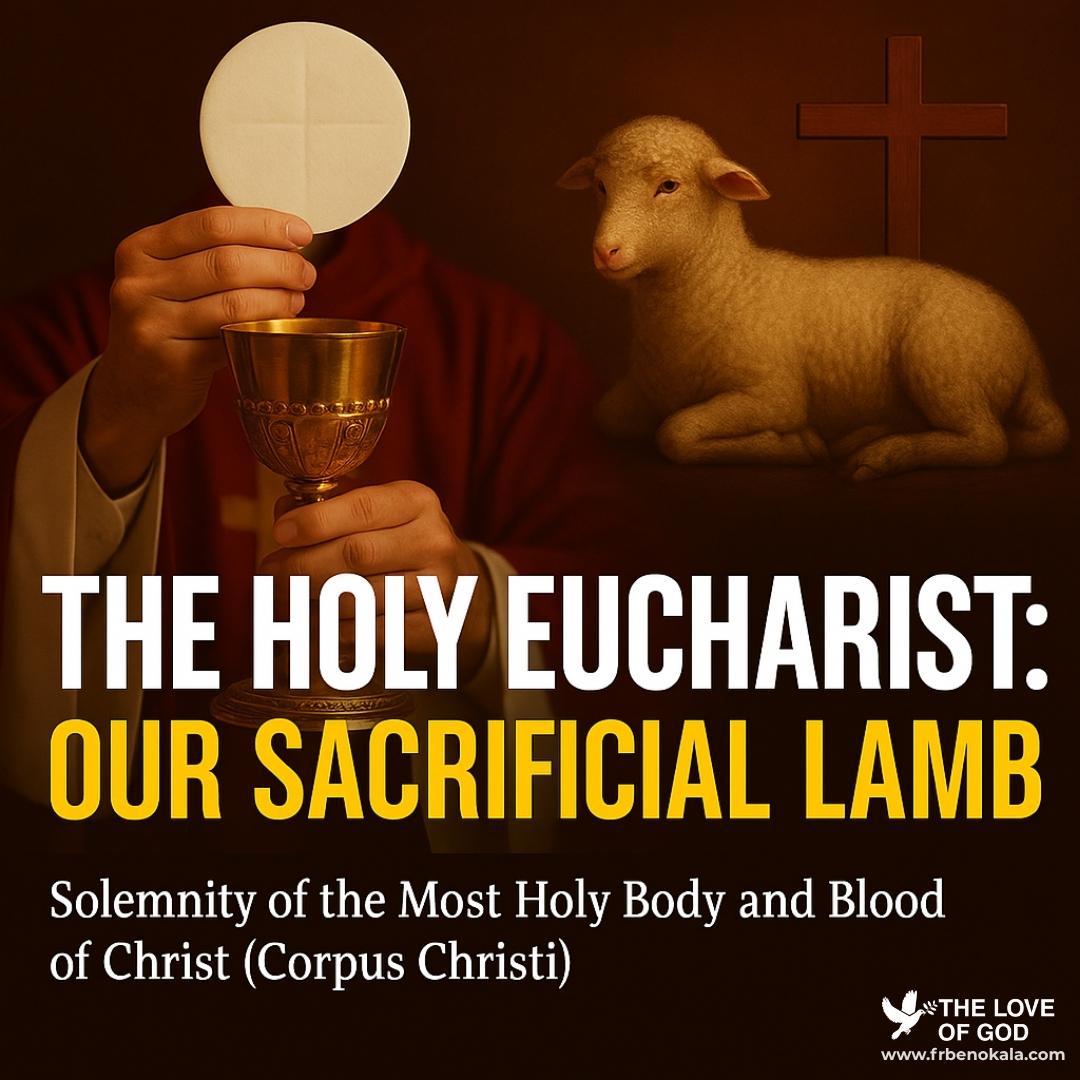HOMILY OF THE 2ND SUNDAY OF EASTER, YEAR B
1st Reading (Acts 4:32–35); 2nd Reading (1 John 5:1–7); Gospel (John 20:19–31)
In the solemn narrative of the Passion of Jesus Christ, where the shadows of betrayal, denial, and injustice loomed large, there emerged a beacon of unfathomable forgiveness. The figures of the Pharisees, Jewish authorities, and a chorus of betrayers and deniers each played their part in a story that seemed destined for tragedy. Nevertheless, in the midst of this, the central figure of Christ responded not with vengeance or malice. But with an act of loving mercy so profound that it would forever alter the course of human history.
With compassion that pierced the darkness of human failings, Jesus Christ offered forgiveness to all. Cleansing humanity’s sins with His precious blood and sanctifying souls with the purifying waters of baptism. As we reflect upon the homily of the Divine Mercy Sunday, let us ponder deeply on the essence of God’s mercy and the transformative power it holds within the Christian experience.
The Community Spirit and Divine Mercy in Action

The first and second readings of today strongly emphasize that love for one another is the sign that will prove to unbelievers that we have real faith in the Risen Christ. The early Christian community, lived in a spirit of unity and shared all things in common (Acts 4:32).
This radical embodiment of community life is not merely a historical account but a theological ideal that challenges us to consider the nature of our relationships with one another. It is a testimony to the power of shared love and mutual care, which are intrinsic to the divine essence we are called to emulate. Hence, communal living helps one to develop the spirit of mercy and forgiveness.
Inheriting the Attributes of Divine Love through Faith

In the second reading, St. John further elucidates the victory that overcomes the world—our faith (1 John 5:4). It is through believing in Jesus Christ as the Son of God that we are born of God and inherit His attributes. This spiritual rebirth through faith and baptism bestows upon us the capacity for love, mercy, care, compassion, and charity. These virtues are not abstract concepts but tangible realities that manifest in our daily interactions and the communal spirit we foster.
The Risen Christ: A Theological Affirmation of Divine Mercy

The gospel reading presents us with the poignant scene of the Risen Christ. Here, Jesus Christ appears to His disciples after His resurrection, imparting them with an inestimable peace. Thus entrusting them with the mission of forgiveness to continue His redemptive work on earth (John 20:23). This is the crux of the Easter message. That is, God’s loving mercy, which is not confined to the annals of history but an ever-present reality (Hebrews 8:12).
To continue Christ’s redemptive work on earth implies drawing humanity closer to God’s friendship as agents of His Divine Mercy. Undoubtedly, the most practical way of showing this mercy is through the forgiveness of sins. This is Christ’s powerful gift to humanity through the Church. Moreover, Christ’s resurrection is a theological affirmation of life’s triumph over death, love’s victory over hatred, and mercy’s conquest over judgment.
The Power of Divine Mercy in the Sacrament of Reconciliation

The power of divine mercy is eminent in the Sacrament of Reconciliation. Jesus Christ gave His apostles the power to forgive sins. This apostolic authority has been passed down through the ages via the sacrament of Holy Orders, in which bishops ordain priests. Through ordination, all Catholic priests receive the authority to act in the person of Christ (in persona Christi), which includes the ability to administer the sacraments, one of which is the Sacrament of Reconciliation (also known as Confession or Penance).
This power is referred to as “the spiritual keys of authority” to bind and loose sins, as described in the New Testament (Matthew 16:19, Matthew 18:18, and John 20:23). This is an essential aspect of Catholic sacramental theology and the understanding of the priesthood. In this light, we are called to become agents of Divine Mercy, reflecting the love and forgiveness of Christ in our own lives.
Moreover, the sacrament of reconciliation is a profound spiritual practice that not only reconciles us with God but also empowers us to extend mercy to others. It is a sacramental encounter that brings to fruition the theological ideal of restorative justice, where forgiveness is both received and given.
Emulating Christ’s Loving Mercy: A Moral Obligation of Forgiveness

Despite the atrocious acts perpetrated by the Pharisees, Jewish authorities, sycophants, betrayers, deniers, etc., during the Palm Sunday narrative, Christ still forgave them all without any grudge or malice. He demonstrated His loving mercy upon humanity by wiping away her sins with His precious blood and sanctifying her with the water of baptism (1 Corinthians 6:11). Hence, God’s saving plan for humanity has been accomplished once and for all by the redemptive death and resurrection of His only begotten Son, Jesus Christ. This is the heart of the Easter message, and that is where God’s power lies.
As we consider our moral obligation to forgive, we must confront the philosophical dilemma of justice versus mercy. To withhold forgiveness is to deny the very essence of God’s nature within us. The refusal to forgive is a self-imposed exile from the peace and power of God’s love. However, to forgive is to participate in the divine life, to act in concert with the redemptive work of Christ, and to contribute to the healing of the world.
The Spiritual Benefits of Divine Mercy and the Forgiveness of Others

Divine mercy and the forgiveness of others are concepts that are deeply rooted in many spiritual and religious traditions. These practices can have profound effects on an individual’s spiritual well-being and growth. Here are some of the spiritual benefits associated with divine mercy and forgiving others:
1. Inner Peace:
Forgiving others can lead to a sense of inner peace and calm. Holding onto anger and resentment often causes inner turmoil, while forgiveness can bring about a sense of serenity (Matthew 6:14–15).
2. Spiritual Growth:
Engaging in acts of mercy and forgiveness can be seen as aligning oneself with divine qualities, which can lead to spiritual growth and development (Ephesians 4:32).
3. Freedom from Negative Emotions:
Forgiveness can free a person from the burden of negative emotions such as anger, bitterness, and the desire for revenge, which can hinder spiritual progress (Colossians 3:13).
4. Spiritual Healing:
Both giving and receiving forgiveness can lead to emotional and spiritual healing, mending relationships, and helping individuals move past hurts and traumas (James 5:16).
5. Compassion and Empathy:
Practicing mercy and forgiveness can increase one’s capacity for compassion and empathy towards others, fostering a deeper understanding of human frailty and the challenges people face (Luke 6:36).
6. Release from Karma:
In some spiritual beliefs, forgiveness is thought to release negative karmic ties, allowing for the resolution of past wrongs and the clearing of spiritual debts (Matthew 18:21–22).
7. Connection with the Divine:
Many traditions teach that forgiveness is a divine attribute. By practicing forgiveness, individuals may feel a closer connection to the divine power (Psalm 103:12).
8. Improved Relationships:
Forgiveness can repair and strengthen relationships, which is often seen as essential for a community’s spiritual health and the individual’s sense of belonging (Proverbs 17:9).
9. Modelling Virtuous Behaviour:
Forgiving others sets a positive example for others to follow, potentially creating a ripple effect of mercy and compassion within a community (Ephesians 4:31–32).
10. Reduction of Ego:
Forgiving others can help in reducing the ego and promoting humility. It involves acknowledging one’s own imperfections and the possibility of making mistakes (Matthew 6:14).
11. Enhance Spiritual Well-Being:
Spiritual well-being is closely linked to physical and emotional health. Forgiveness can reduce stress and lead to a healthier life (1 Peter 3:8–9).
12. Genuine Love:
Embracing forgiveness can lead to a greater sense of genuine love and a recognition of the interconnectedness of all beings (1 Corinthians 13:4–7).
13. Moral Integrity:
Acting with mercy and forgiveness can reinforce one’s moral values and commitment to living a principled life (Micah 6:8).
14. Letting Go:
Forgiveness allows individuals to let go of the past and live more fully in the present moment. This is often emphasized in spiritual practices as the key to enlightenment or spiritual awakening (Philippians 3:13–14).
15. Transformation:
The act of forgiveness can be transformative. It leads to personal change and a reorientation towards a more loving and compassionate way of being (Romans 12:2).
A Call to Live Out the Loving Mercy of Jesus Christ

Dearly beloved, it is important to note that the process of forgiveness can be complex and challenging. Certainly, it often requires time, reflection, and sometimes even guidance from spiritual leaders or counsellors. Of course, the spiritual benefits of embracing divine mercy and forgiveness can be profound and life-changing. Besides, forgiving our offenders can only be easy when we allow ourselves to be guided by the Holy Spirit (Lamentations 3:22–23).
Furthermore, even though we are sinners, God still offers us His divine mercy through the sacrament of reconciliation (Romans 3:23). Certainly, we have the moral obligation to extend the same mercy to others. This is because refusing to forgive those who have offended us is simply denying ourselves God’s mercy (Matthew 6:14–15). Just as Christ says, “Blessed are the merciful, for they shall obtain mercy” (Matthew 5:7).
Conclusion
The readings of today call us to a deeper understanding and practice of Divine Mercy. It is a spiritual journey that invites us to transcend our limitations and embrace the fullness of love and forgiveness. As we continue to celebrate the Easter season, let us commit to living out the loving mercy of our Saviour. Thereby, becoming beacons of hope and instruments of peace and mercy in a world that yearns for redemption.
This extraordinary display of divine benevolence reveals the true essence of God’s power. It marks the ultimate fulfilment of God’s plan through the redemptive sacrifice and triumphant resurrection of His Son, Jesus Christ. As we contemplate this cornerstone of faith, let us explore the depths of God’s mercy that defies human understanding. Let us continue to reflect on God’s mercy upon us through the Divine Mercy Prayer.
Prayer:
Almighty and Eternal God, your mercy is endless, and your treasury of compassion is inexhaustible. Look with kindness upon us and increase your mercy within us. So that, in difficult moments, we may not despair, nor become despondent. But may, with great confidence, submit ourselves to your Holy Will, which is Love and Mercy itself, Amen.
Dearly beloved, I pray the Almighty God to forgive all your sins. May the Holy Spirit give you peace of mind and the grace to always forgive your offenders. Let the divine mercy of God envelope and possess you and family for great exploits. + In the name of the Father, and of the Son, and of the Holy Spirit, Amen.
Peace of Christ be with you…
Rev. Fr. Benjamin Okala, C.S.Sp.
You can read up related reflection on: FORGIVENESS: GATEWAY TO TRUE PEACE AND LOVE



